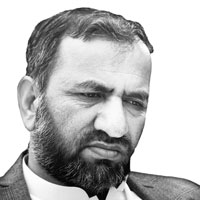BRUSSELS — For two years, Mullah Mansour tried to hide the fact that the supreme leader of the Taliban, Mullah Omar, had died. And in those years, Mansour managed to keep the deadly Afghan insurgency going, even growing. But whatever satisfaction he might have taken from that feat did not last long. He had run the Taliban officially for only about 10 months when American drones blew him up in Pakistan last week near the Afghan border.
Whether that will make peace in Afghanistan easier to achieve, or more difficult, remains at this point an open queston.
I remember I first met Mullah Mansour in 1995, when the Taliban were just being created. He got in touch because he wanted me to cover his enlistment, along with his friends, in the fledgling Afghan organization.
The next day at a busy Peshawar bus station, I saw Mansour, wearing big sun glasses and a typical black Afghan turban, giving a short speech saying he and his group had finished their religious studies (taliban, you will recall, means students). They were on their way, he said, to join Mullah Omar in his drive to kick out the evil warlords tearing Afghanistan apart and to establish an Afghan government based on Sharia, Islamic law.
The next I heard, Mansour had become one of Mullah Omar’s key aides.
“From day one, Mansour grabbed Mullah Omar’s attention,” one of his old friends reminded me recently. “He was put in charge of Taliban airport operations, and in 1997 and 1998 he went to Dubai and Europe to buy weapons from Russian weapons smugglers.”
Mullah Mansour, as this friend put it, “was smart, calm, and carried out his job successfully.” So Mullah Omar appointed him the Taliban minister of civil aviation and he began a rise that would make him the head of the Afghan air force, such as it was, and minister of defense.
As Douglas Farah and Stephen Braun reported in their book on the notorious Russian arms dealer, Victor Bout, Merchant of Death: Money, Guns, Planes, and the Man Who Makes War Possible, Mansour worked through a young mullah running the Afghan government’s Ariana Airlines office in Sharjah, the emirate next to Dubai. The agent’s qualifications in aviation and arms dealing were negligible, but Mansour valued “his unwavering loyalty, his stealth and discretion, and his years of fundamentalist religious training.” Such, always, were Mansour’s criteria for advancement.
Another source high in Taliban ranks says Mullah Mansour showed the kind of modesty in his life that helps burnish legends among Afgjhans. “He used to travel by old public transport, on bikes and in ’70s model taxis,” according to this source. “He never kept bodyguards in Pakistan, amd would appear and disappear like some stealthy creature of the night.”
More recently, when Pakistan put too much pressure on the Taliban, Mansour went to Iran to send a message to Pakistan that he and his organization could turn elsewhere for support. “It worked,” said this Taliban source. “Pakistan calmed down.” The United States looked askance at the Iran gambit as well.
The same senior Taliban source said Mansour’s loss is “a critical blow,” but said the Taliban is a religious movement, not one based on individuals, and its members have faith a new leader will replace the old, while policy will not change.
There is widespread speculation that Mansour might have been the best interlocutor for peace talks available on the Taliban side. Those close to him say that he was flexible about the idea of talks, in any case, even if he doubted the intentions and sincerity of the Afghan government.
“His priority was to consolidate his power against internal troubles, then go for peace talks,” said a member of the Taliban office in Qatar, which acts as a liaison in efforts to get a negotiated end to the war.
Most of the Afghan Taliban sources we could reach say that negotiations are like a tablet of poison for any future Taliban leader, since only a very strong one with firm backing could take the bold step of reconciliation. Hence Mullah Mansour’s death is likely to make the chances of peace even slimmer than they already were.
But there are few tears being shed for among officials in Kabul.
Amrullah Saleh, former head of Afghan intelligence, says a picture of the American drone that hit Mullah Mansour, “the killer of innocent Afghans,” should be placed in an Afghan museum “as a symbol of justice.”
“Afg Democracy needs Drones 4 a while,” Saleh tweeted.
An Afghan citizen from Kabul, Haji Yaseen, who lost his son in a Taliban bombing a few years back, says he’d like to see Mulah Mansour’s drone-blasted body. It would remind him of his boy.
“Thank God and America for taking revenge for my son,” he said.






